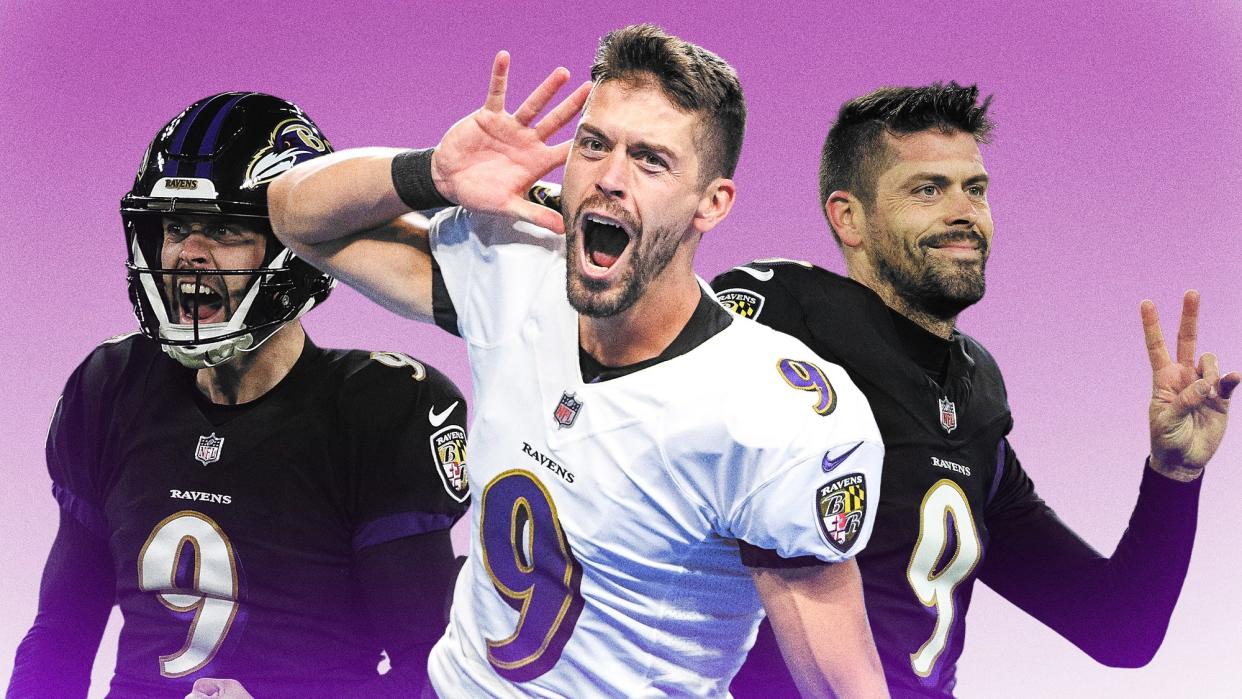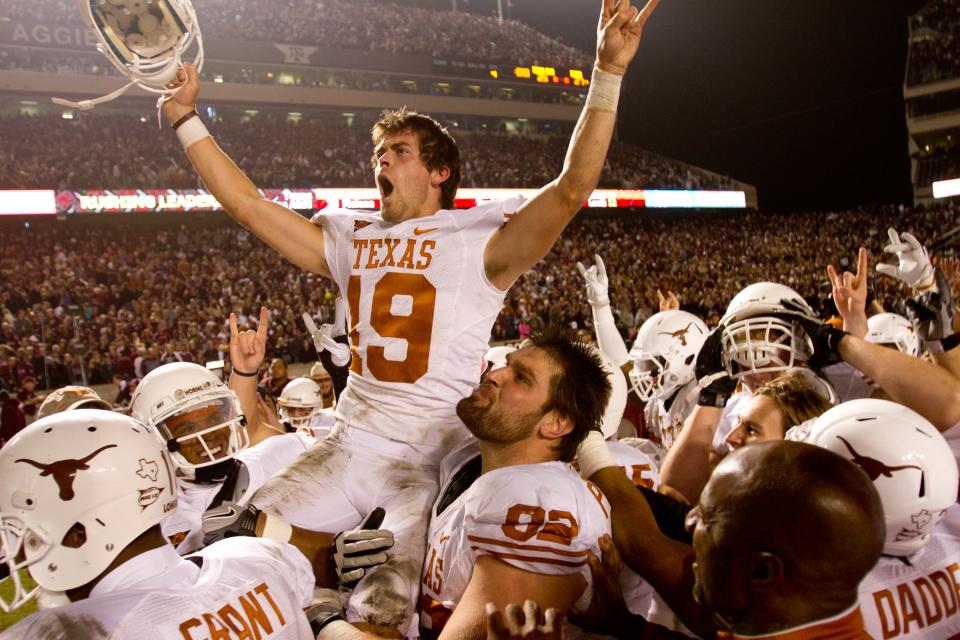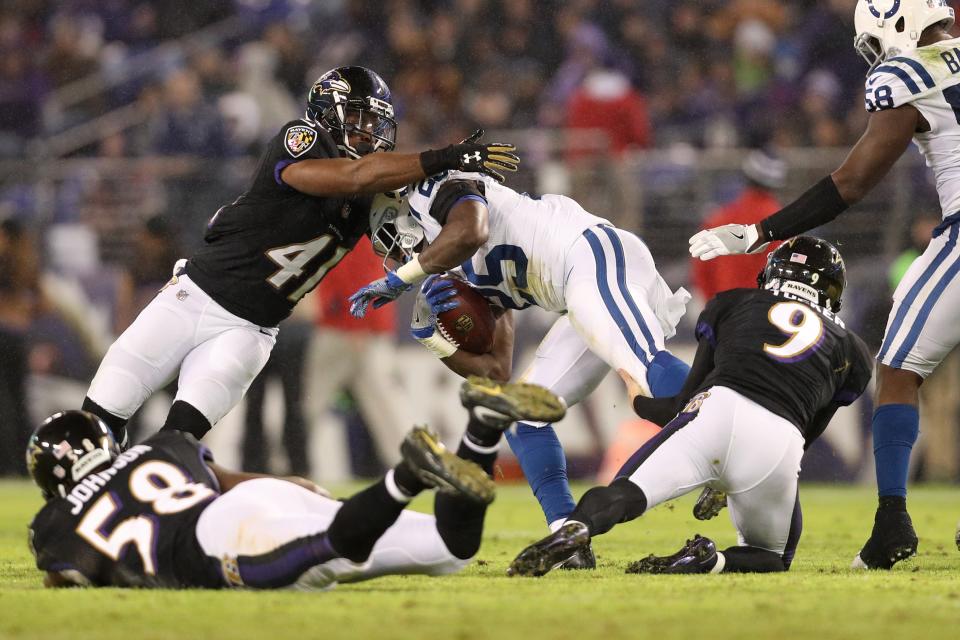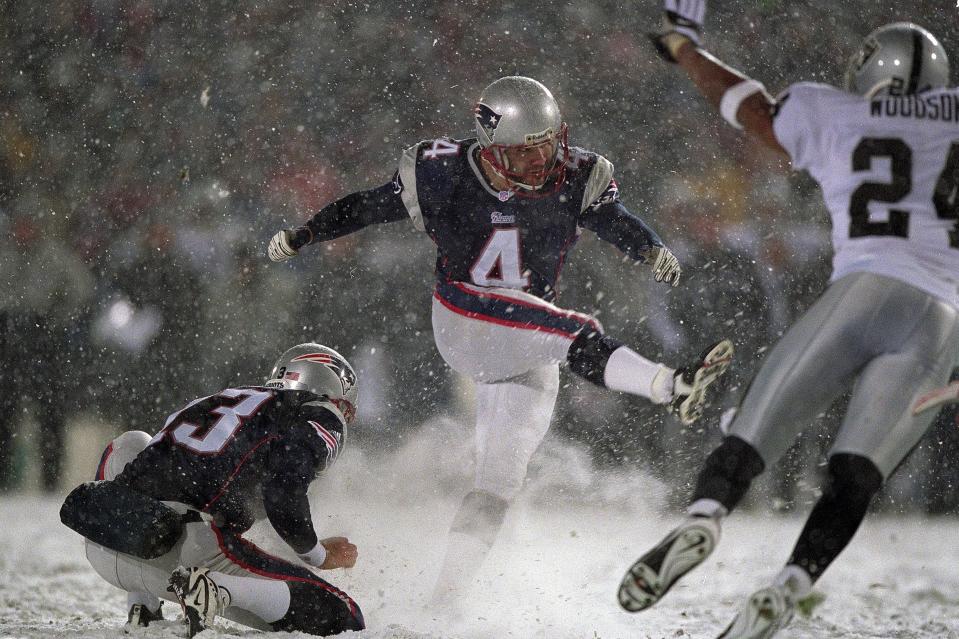Justin Tucker Once Made a 79-Yard Field Goal

- Oops!Something went wrong.Please try again later.
- Oops!Something went wrong.Please try again later.
- Oops!Something went wrong.Please try again later.
- Oops!Something went wrong.Please try again later.
Photographs: Getty Images; Collage: Gabe Conte
The life of an NFL kicker can be lonely. Most of the game is spent off to the side, kicking into a net as the game unfolds. The glory of a big make often pales in comparison to the ridicule that follows a miss. Becoming a beloved kicker doesn’t just mean doing your job well once, or a few times—it means operating at an insanely high level for an insanely long time. Few people understand this better than Justin Tucker, the Baltimore Ravens’ veteran who has a Super Bowl ring, five All-Pro nods, and a serious claim to be the best kicker to ever put foot to ball.
The argument for Tucker: he has the best field goal accuracy in league history (90.2%). Simply put, no kicker has ever been more reliable than No. 9 in purple—who’s played his entire career in a division with zero indoor stadiums, no less—and he also holds the record for longest field goal ever made, cashing a game winner from 66 yards during the 2021 season. Tucker’s big leg has also allowed him to make the second-most 50+ yarders in league history, a record he could very well own when it’s all said and done. He’s money from long range, and he’s virtually automatic from short range, where he’s made 64 of his last 65 kicks from 40 yards or less.
But football—and especially kicking—is a fickle game. Tucker enters the final week of this NFL season with an uncharacteristic five misses—but that hasn’t slowed down the Ravens. They are the unquestioned Super Bowl favorites, and while he doesn’t want to get too far ahead of himself, Tucker has thought about how kicking in the big game this year would differ from the experience he had 11 years ago as a precocious rookie. In a recent conversation with GQ, the 34-year-old took us through his special teams journey.
When did you know that you were good at kicking? It’s much more specific than throwing, for example, where you can just be throwing rocks in a lake one day and find out you have a good arm.
I would say at the collegiate and professional levels, there is a high level of specialization that comes with being a kicker, punter, or even a long snapper for that matter. But I found out that I had some ability to kick a ball when I was playing soccer growing up. At maybe 13 or 14 years old I realized that I had some power behind my leg swing, especially because on the soccer field, I kept kicking the ball over the bar. The suggestion was made to me: You know you can score points on the football field doing that? The ball is just shaped a little differently!
I started playing football in eighth grade. That was my introduction to the sport as a whole. I played a bunch of different positions: running back, middle linebacker, safety, and then kicker and punter. But this was all on the eighth grade B-team at Hill Country Middle School! Thank goodness I got the opportunity to play all those positions and get a feel for the game. That’s when I fell in love with the sport. From there I figured out how to kick a ball the right way. There is a level of wanting to be an athlete first and then fine-tuning it as you go. But by the time I was entering tenth grade I had a foundation. Those years from eighth through tenth grade were when I figured out that I had a chance to be kind of good at this.
What was the scouting report on Justin Tucker the running back?
I was basically a 13-year-old Christian McCaffrey out there. I looked pretty awesome toting the rock. The full scouting report would be, “Hey, it was fun while it lasted.”
Sounds like a situation of, “Well, somebody has to play running back.”
To be fair, I was pretty quick! I had some agility and some vision. That was one of the things I thought I did really well in soccer. I was a center attacking midfielder and I could see the field, and all the open lanes where the through passes needed to be threaded. I had some natural ability there that transferred over to running back. In high school when I played free safety, I wasn’t bad. But I definitely wasn’t going to get a Division I scholarship playing free safety.
You went to college at the University of Texas, which is obviously a football-obsessed school. Did people know who you were? Or did you have to be like, “No, really! I’m on the team!”
[laughing] Maybe a little bit of both. I didn’t handle the place kicking duties until my junior and senior years. Before then I kicked off and I split punting duties. I would be recognized as a football player sporadically at best. Once I started kicking field goals and putting points on the board week in and week out, more and more folks would go, “Oh! That’s the dude who kicks for the Texas Longhorns!” It was not nearly the same level as Colt McCoy, Sergio Kindle, or any of my teammates at the premier positions experienced.

Texas v Texas A&M
Then after college, you go undrafted. Did you expect to hear your name on Draft Day?
I didn’t have, quote unquote, people in my ear. I had an agent who I hired shortly after the 2011 season. That was kind of it. I had a couple of coaches at Texas who had a little bit of an idea about what could happen. But as far as expectations coming into the draft, I was pretty realistic. I was thinking maybe fifth or sixth round. I could also just not get drafted and that would be fine. I knew no matter what I was going to have to compete for a spot, and there’s 32 spots if I want to make a team. It didn’t matter if I was second or third round or if I was undrafted. I’d have to win a battle [in training camp].
As far as draft parties or family gatherings, I kind of had an un-draft party. I knew there was a chance I could get picked, but it was pretty slim. A handful of friends and family members who wanted to watch the third day of the draft came to this outdoor sports bar near campus. No expectations except everybody would get a couple of beers and a plate of nachos. As the final picks came and went and I sat there with my phone in my hand waiting for a call, I didn’t get one. Immediately after Mr. Irrelevant was announced, my phone started blowing up. The first person was Jerry Rosburg, special teams coordinator with the Ravens. I guess you could say the rest is history.
But then once you get to the Ravens, you guys go ahead and win the Super Bowl your rookie year! Not only that, but you handled the opening kickoff in the Super Bowl. Were you nervous about that?
Yes and no. Every time I go out on the field, my childhood dream is coming true. But the opening kick in the Super Bowl? I’d always seen the slow motion videos with all of the flash bulbs, it’s a tradition going back however many decades. In 2013 when I did it, I experienced the cameras flashing. Instagram had just become a thing, so there were still real cameras capturing the moment. Now, with everyone’s phones up, the effect isn’t the same. Hopefully we get that opportunity again and I can see everyone with their phone in their hand, even though it’s a little anticlimactic.
Are kickoffs still scary to you?
Of course it is! I guess I wouldn’t say that it’s fully scary, but it’s definitely nerve wracking. Every single returner is one of the best athletes in the world. They’re usually the fastest guy on the field, and more often than not, they’re going to have 20 to 50 pounds on me. If I’m back there and I see that I have to make an open-field tackle on one of these guys, of course my heart starts racing a little bit. More often than not when I’ve been in that situation, I’ve been able to slow the guy down. You go on pure instincts, arrow through snow.
Do you know how many tackles you have?
I don’t know off the top of my head, but I think it’s gotta be somewhere between like eight and 14. Whether I’m credited for an assisted tackle, or jumping on a pile at the end of a play, maybe the stats reflect that. [Ed.: Tucker has racked up seven tackles and one assisted tackle.]

Indianapolis Colts v Baltimore Ravens
When you played Jacksonville earlier this year the returner fumbled the kickoff and you got in there pointing, as if you had any idea who actually had the ball at the bottom of the pile.
Nobody has any idea! You just point. We’re in the entertainment industry—it’s great for TV. When you’re standing at the edge of a scrum, you have no idea who actually has the ball. Unless you’re actually in there with your hands on the ball or right there at the bottom, you have no idea. But just for the vibes, you gotta point!
With kickers, your on-field results are so binary, at least when it comes to field goals. You either make or you miss, and everyone can see it very plainly. Then you miss three or four kicks, and all of a sudden it’s a bad year. How do you evaluate yourself? Would you consider this a “down year” for you?
I think the guys who are the best for the longest amount of time are process driven, focusing on the action and not the consequence. That is a mentality that has served us well for as long as I’ve been here. Especially with the conditions we play in in the AFC North, we’re dealing with a lot from one kick to the next. In order to give yourself the best chance to make the kick, you have to think of the things that are most important in that space and time. Seeing the ball snapped, seeing the ball spotted, staying balanced through the kick, wide plant, finishing at the target. All of those things help us make kicks. Everything else is secondary—it’s not going to contribute to making or missing the kick. As long as I see the ball and strike the ball in the way I’m supposed to, I know when it comes off my foot—pretty much immediately—whether it’s going to go through the uprights.
Every once in a while the wind will blow the ball in a way I’m not expecting, or my plant will shift and slide more than I’m expecting, and then the ball doesn’t go through. But the hardest kick to make is the one after a miss. I always emphasize that we make kicks, but once in a while I miss one. There’s no sense blaming anyone or anything. Oh, the field was a little unstable. You know what? I needed to be a little lighter on my feet. I tend to lean more into the process than the results. At the same time, the results are incredibly important and the stakes are very high. But to give us the best chance at a positive result, I believe you have to focus on the process.
That said, is there one particular miss from your career that eats at you the most?
Probably all of them. I remember all of them and they wake me up at three in the morning. But I try to focus on the positives. Every single big kick that we’ve made, I don’t know, as soon as I kick the ball and I know it’s going through, there’s a moment where I kind of black out from the adrenaline. The exhilaration takes over. All the hard work comes to fruition in about 1.3 seconds. There’s something really poetic or cathartic about that moment.
The feeling after a miss is so visceral and awful that, as much as I want to forget about it, move on, be a goldfish or whatever other cliche, it’s just basically impossible to do that. The misses sting so much more than the makes feel rewarding. At the exact same time, that goes back to the whole process-over-outcome, action-over-consequence principle. That’s not just an idea, it’s a principle written in stone. Making it a point to move on and compartmentalize after a miss is very difficult, but it’s imperative to sustaining success.
Is there a kicker fraternity? Like when another kicker has a big miss, do you and the other kickers around the league feel compelled to reach out to them? Or is there an unwritten code not to say anything?
There’s kind of a serendipitous force—whether it’s karma or energy, I don’t know—[but] I do believe in thinking and acting positively about the other guys that play this position. We all understand what we’re going through, whether it’s coming off a game winner or one that gets away from you. I’ve had guys reach out to me after good kicks and bad kicks, and I’ve done the same for other guys. That is part of the fraternity of kickers and specialists in this league, like you said.
When we’re playing another team, throughout the course of the game, I’m rooting for the guy. I want to see everybody play their best. But I want the Ravens to win. If a guy misses a kick and that means we win the game, I feel bad for the guy and great for our team. Being a specialist in this league is kind of like a brotherhood, and I think they’d all echo the same sentiment. You root for the individuals to do well, but you want your team to win.
Do you consider yourself the GOAT of kicking?
I understand why you feel like you have to ask that question. I respect it. I’m going to give you a little bit of a non-answer. At this point, I don’t think about comparing myself to anyone else. I want to compare myself to my standard as a kicker. I look at my performance and ask myself if I competed at an elite level. If the answer to that question is yes after every kick, then I feel good. If I can look back at my career—hopefully many years from now—and say that I performed at an elite level when my teammates and coaches needed me the most, then I feel good.
Whenever you’re using superlatives or GOAT, that has a comparative connotation. Denotation? My English literature education is escaping me right now. But it’s inherently competitive. If I do have to pick a GOAT, who’s had the greatest career of all time? I’ll for sure say Adam Vinatieri. The number of massive kicks that he made throughout his career is almost unmatched. I would also shout out somebody who I think transcended the game in a way that nobody else at the time could have possibly matched. That’s Morten Andersen. Morten’s approach to the game, his athleticism, the way he performed in the biggest moments, he inspired a whole generation of kickers that followed him. For both of those guys, especially Adam, they’ve served as inspiration for me.

New England Patriots Adam Vinatieri, 2002 AFC Playoffs
What’s the furthest kick you’ve ever made, period? This could be indoor, outdoor, off a tee, at practice, at a random high school field. What’s your max?
With a normal field goal approach, it’d be 79 yards. For a fair catch free kick approach where I can line up from however far I want, it’d be 85 yards. Both of those were perfect conditions with a tail wind.
But where we play—I’m looking outside right now, the wind’s whipping around and it’s 30 degrees—getting a kick to go even 52 yards on a day like today is pretty challenging. So, 85 is out of the question. A tornado of things would have to happen for that opportunity to present itself. You might have to actually have a tornado carry the ball 85 yards.
What’s the furthest you’ve ever blasted a kickoff?
Oh, man. I’m not 100 percent sure. It’d probably be a little north of that 85 number. There’s kind of no way of knowing for sure.
The last question I have to ask is, have you seen the video of your highlights set to Babytron?
[laughs] No! I haven’t, but that’s great. I will be pulling that up immediately.
Originally Appeared on GQ

